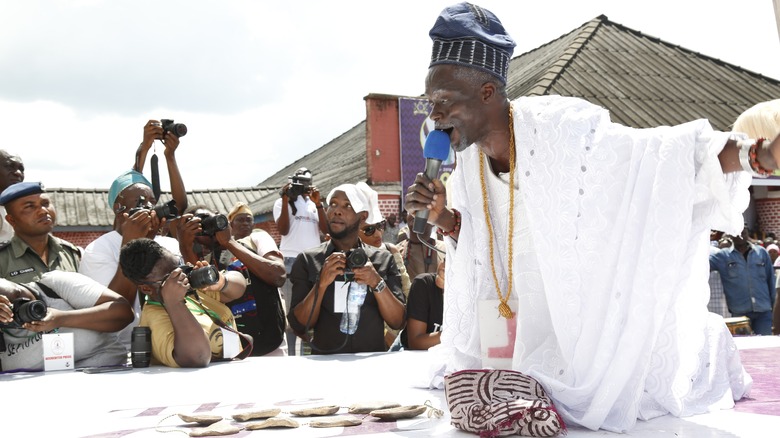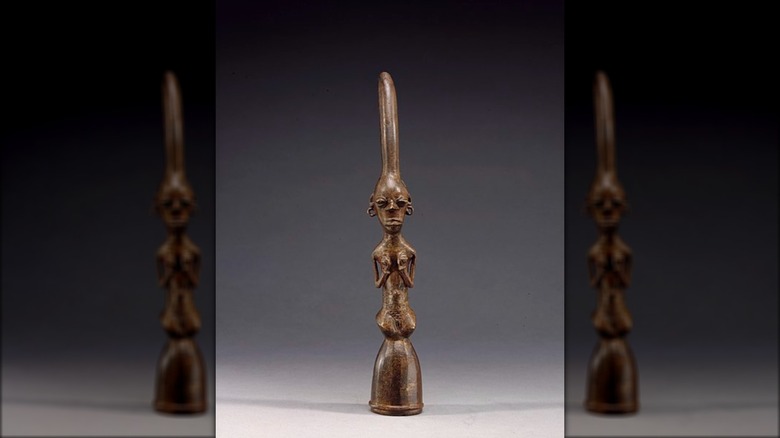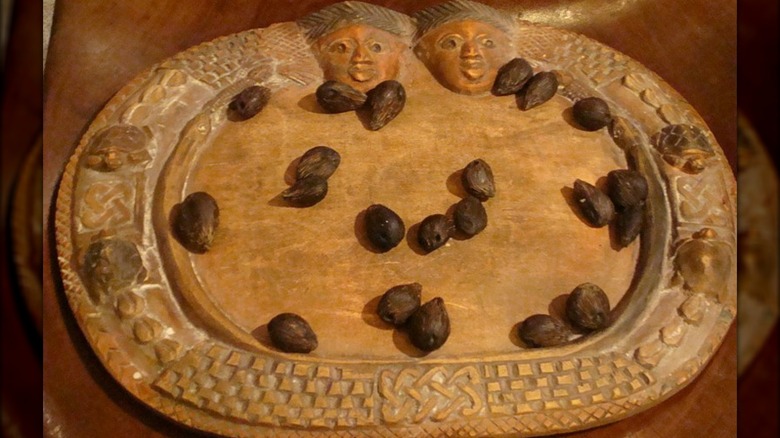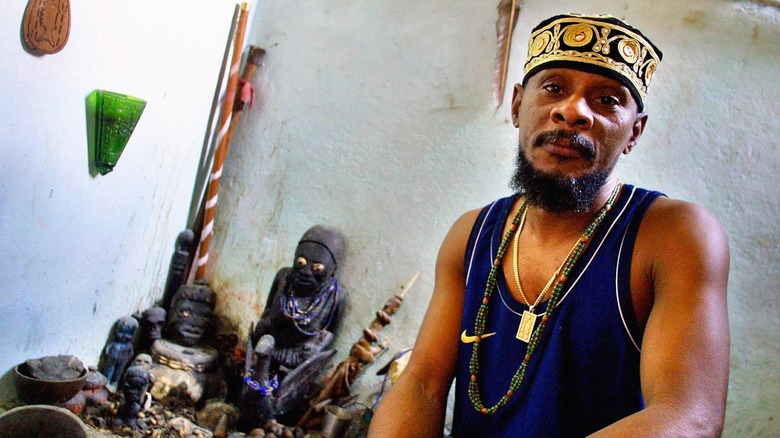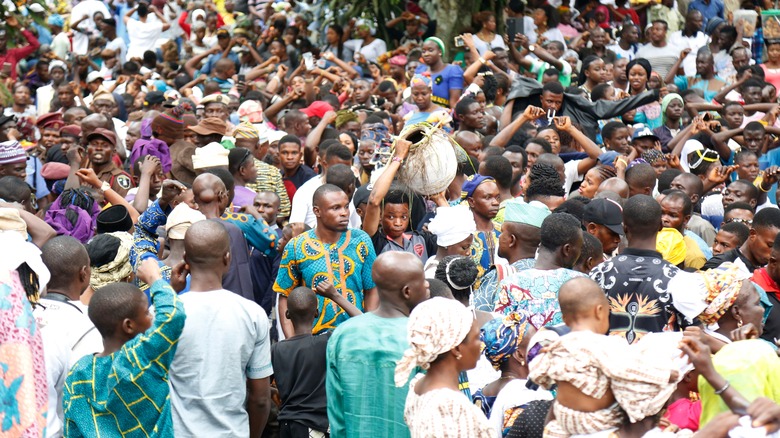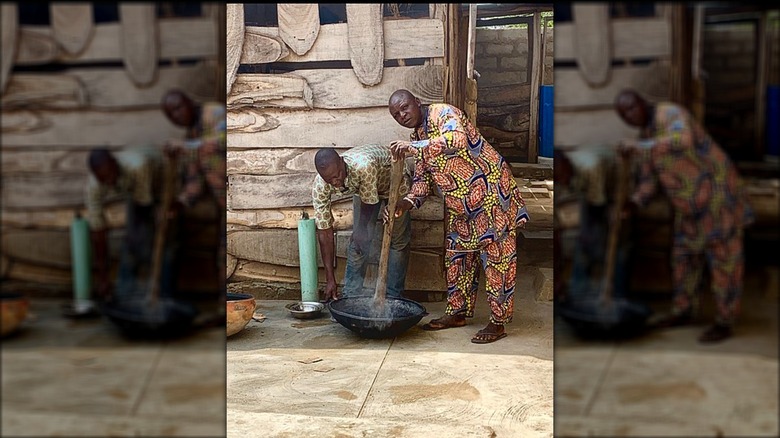What Is Ifa And What Do Followers Believe?
Ifa originated in West Africa — particularly Nigeria, Togo, and Benin — but has in the last few centuries spread across the globe with the African diaspora, especially in the Americas and the Caribbean. Though Ifa is often referred to as a religion, it is also considered a broader belief system within the greater Yoruba culture, though variations also exist among the nearby Igbo and Ewe people. Indeed, some of its adherents see it more as a "way of life," and a way of experiencing the world around us in the vein of philosophical religions such as Buddhism and Daoism. Central to the Ifa culture is a system of divination that deploys a combination of traditional sacred objects and verse chants to elicit insights, advice, and information for the community at important junctures.
The exact origins of Ifa's introduction into the Yoruba culture are difficult to pin down. As the scholar Reverend Samuel Johnson notes in his "History of the Yorubas," one theory is that it derives from the story of a blind child named Setilu, whose powers of divination became apparent at the age of 5, and whose methods of invoking supernatural insights might be the basis of the Ifa tradition. Johnson also claims that Setilu's story might have led the Oyo King Onigbogi to attempt to officially introduce the divination system to West Africa during his reign in the 16th century, perhaps leading to his undoing and exile — while Ifa itself remained and continued to grow.
Orunmila, the patron deity of Ifa
Ifa itself is the alternate name for Orunmila, the Yoruba deity around whom the Ifa divination system revolves. Orunmila is described as the creator of the Ifa divination system, the central ritual that practitioners take part in. He is described as being the deity of wisdom and learning. According to The Nation, Orunmila is widely considered to have insights into and knowledge of all aspects of the universe, which includes the entirety of time and space as humans perceive it.
One version of the myth of Orunmila as told by certain Ifa practitioners is that he once walked the earth with his eight children, caring for humanity. However, one of his children insulted him, and in his anger he left the Earth and ascended to heaven, taking his knowledge and wisdom with him. But while he refused entreaties from humans to return, he gave his children a set of 16 palm nuts through which to communicate with him and receive messages — the basis of Ifa divination.
Though Orunmila is of vital importance to the Ifa belief system and Ifa divination, he is not the supreme God in Yoruba. That God's name is Olorun — or Olodumare — and it is the only deity that Ifa practitioners tend to worship outright.
[Featured image by Nationaal Museum van Wereldculturen via Wikimedia Commons | Cropped and scaled | CC BY-SA 3.0]
The practice of divination
Legend has it the deity Orunmila handed down 16 sacred pine nuts — known as Ikin — to his children and therefore the people of the Earth. Several other objects are also employed in the practice of Ifa divination, as well as a vast quantity of literary material that has been transmitted down the generations through oral recitation.
The objects include the Opele Ifa, a divining chain made of seed casings, beads, and other small decorative objects. Like the Ikin, it is cast upon a specially designed plate or tray, or Opon Ifa. The tray is dusted with a fine divine powder, Iyeposun, into which diviners draw a tally based on the fall of the nuts or chain.
Casting in such a way, the diviner settles on verses from the Ifa literary corpus — the Odu, the Omo Odu, and the Ese — which together provide countless ways that a query might be answered. Other divination methods for communication with other deities also exist in the wider Yoruba culture.
[Featured image by Toluaye via Wikimedia Commons | Cropped and scaled]
The role of Ifa priests
In the Yoruba region, it is uncommon for laypeople to practice the art of Ifa divination themselves the way Westerners might toy with Tarot cards or other scrying methods. Instead, that responsibility lies with a specially trained Ifa priest, or Babalawo. As well as learning to handle the sacred objects used in Ifa divination, they also — over the course of many years — memorize the vast corpus of literary material that they might be directed to recite by any particular cast of the Ikin or Opele Ifa over the course of many years Such divination generally occurs at the behest of lay people as a religious service, helping individuals or communities to make key big decisions in their private or public lives, concerning things like marriages, disputes, or the purchase of property.
But the Babalawo also offers a number of other services to the local community, including the creation and distribution of traditional medicines and the execution of marriages and other ceremonies. They are also generally well-read in Yoruba history and culture. According to The Nation, their title translates as "father of secret," and such figures are considered direct links to Orunmila, who remains cut off from ordinary people.
Honoring one's ancestors
Babalawos are also instrumental in helping lay people interact with their deceased ancestors, evoking them in rituals in a similar fashion to how they might invoke Orunmila for guidance and advice. Babalawos are specially equipped to please the ancestors of ordinary people through their knowledge of the oriki — praise poetry that is chanted in the ancestors' honor.
However, unlike the Babalawos' exclusivity when it comes to communicating with Orunmila, there is nothing in the Ifa tradition that prevents lay people from contacting their ancestors directly — in fact, it is considered something of a responsibility, and many Yorubas typically make an effort to communicate with their deceased ancestors on a daily basis. Practitioners of Ifa often have an ancestors shrine in their home, which is used to evoke memories of the person in question, while the Ifa tradition also contains several annual festivals through which communities might celebrate their ancestors collectively.
The wax and wane of Ifa around the world
In April 2019, The Washington Post reported that in areas of the U.S. such as Maryland, religions such as Ifa and Vodou were beginning to find many new practitioners among African Americans looking to reconnect with the belief systems traditional to their African heritage. In Baltimore and beyond, groups interested in training as priests in practices such as Ifa have grown impressively year after year.
In 2005, the UNESCO world heritage body added the Ifa divination system to the Representative List of the Intangible Cultural Heritage of Humanity, highlighting its importance to world culture and underscoring the need for the tradition to be protected. Sadly, UNESCO reports that interest in Ifa is declining in Africa, where elder Ifa priests are having trouble capturing the interest of younger Yorubas and transmitting their expansive knowledge of the Ifa divination practices and verses to the next generation.
[Featured image by Rbt323 via Wikimedia Commons | Cropped and scaled | CC BY-SA 4.0]
